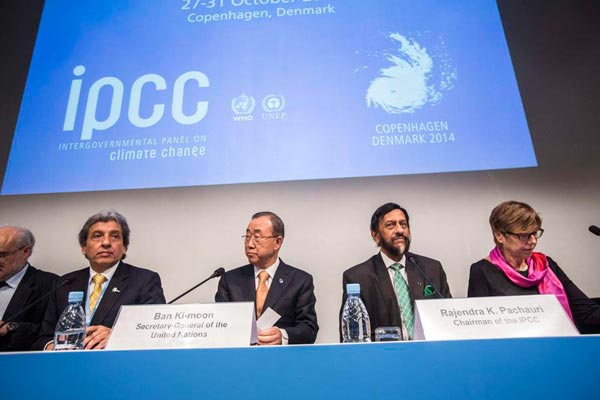New report: chances still there to mitigate global warming
Updated: 2014-11-03 04:35
By Fu Jing(chinadaily.com.cn)
|
|||||||||||
|
 |
|
(L-R) Manuel Pulgar-Vidal, Peru's Minister of Environment, U.N. Secretary-General Ban Ki-moon, Intergovernmental Panel on Climate Change (IPCC) Chairman Rajendra Pachauri and Renate Christ, Secretary of the IPCC present the AR5 Synthesis Report during a news conference in Copenhagen, November 2, 2014. |
"If left unchecked, climate change will increase the likelihood of severe, pervasive and irreversible impacts for people and ecosystems," the scientists said in the Synthesis Report released by the Intergovernmental Panel on Climate Change (IPCC) on Sunday in Copenhagen.
" However, options are available to adapt to climate change and implementing stringent mitigation activities can ensure that the impacts of climate change remain within a manageable range, creating a brighter and more sustainable future."
The findings are designed to become scientific and policy references for the international community when they are in the efforts to achieve a new agreement on greenhouse gas control for 2020-2030 period in the run-up to UN's Paris summit next year. The annual UN climate change negotiation will be organized in Peru, Chile in December.
The Synthesis Report distills and integrates the findings of the IPCC Fifth Assessment Report produced by over 800 scientists and released over the past 13 months – the most comprehensive assessment of climate change ever undertaken.
"We have the means to limit climate change," said R. K. Pachauri, Chair of the IPCC. "The solutions are many and allow for continued economic and human development. All we need is the will to change, which we trust will be motivated by knowledge and an understanding of the science of climate change."
The Synthesis Report confirms that climate change is being registered around the world and warming of the climate system is unequivocal. Since the 1950s many of the observed changes are unprecedented over decades to millennium.
The Synthesis Report makes a clear case that many risks constitute particular challenges for the least developed countries and vulnerable communities, given their limited ability to cope. People who are socially, economically, culturally, politically, institutionally, or otherwise marginalized are especially vulnerable to climate change."
And since mitigation reduces the rate as well as the magnitude of warming, it also increases the time available for adaptation to a particular level of climate change, potentially by several decades.
There are multiple mitigation pathways to achieve the substantial emissions reductions over the next few decades necessary to limit, with a greater than 66 percent chance, the warming to 2ºC – the goal set by governments, said the report.
However, it also warned that delaying additional mitigation to 2030 will substantially increase the technological, economic, social and institutional challenges associated with limiting the warming over the 21st century to below 2ºC relative to pre-industrial levels.
These economic estimates of mitigation costs do not account for the benefits of reduced climate change, nor do they account for the numerous co-benefits associated with human health, livelihoods, and development. "The scientific case for prioritizing action on climate change is clearer than ever," Pachauri said.
"We have little time before the window of opportunity to stay within 2ºC of warming closes. To keep a good chance of staying below 2ºC, and at manageable costs, our emissions should drop by 40 to 70 percent globally between 2010 and 2050, falling to zero or below by 2100. We have that opportunity, and the choice is in our hands."
Related Stories
The dollars in climate change 2014-10-29 07:58
It's climate change, stupid 2014-09-27 09:01
'TV dwells on disaster in covering climate change' 2014-09-25 07:02
Chinese vice premier discusses climate change, bilateral ties with French president 2014-09-24 14:59
UN official urges industrialized countries to pay more for climate change 2014-09-24 11:40
China reaffirms resolve to fight climate change 2014-09-24 04:27
Today's Top News
Beijing backs global multilateral trading system
China's exports rise 11.6% in Oct
Neighbors agree they’ll ‘gradually’ resume talks
Apple hits back at malware in China
China urged to contribute more to Asia-Pacific
China, Russia agree on military co-op
Faster pace set in bid to protect Internet
US, France cite concerns about Iran nuclear talks
Hot Topics
Lunar probe , China growth forecasts, Emission rules get tougher, China seen through 'colored lens', International board,
Editor's Picks

|

|

|

|

|

|





